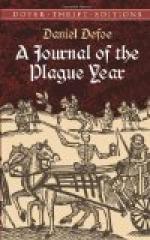One thing, however, must be observed, that as to ships coming in from abroad (as many, you may be sure, did), some who were out in all parts of the world a considerable while before, and some who, when they went out, knew nothing of an infection, or at least of one so terrible,—these came up the river boldly, and delivered their cargoes as they were obliged to do, except just in the two months of August and September, when, the weight of the infection lying, as I may say, all below bridge, nobody durst appear in business for a while. But as this continued but for a few weeks, the homeward-bound ships, especially such whose cargoes were not liable to spoil, came to an anchor, for a time, short of the Pool, or freshwater part of the river, even as low as the river Medway, where several of them ran in; and others lay at the Nore, and in the Hope below Gravesend: so that by the latter end of October there was a very great fleet of homeward-bound ships to come up, such as the like had not been known for many years.
Two particular trades were carried on by water carriage all the while of the infection, and that with little or no interruption, very much to the advantage and comfort of the poor distressed people of the city; and those were the coasting trade for corn, and the Newcastle trade for coals.
The first of these was particularly carried on by small vessels from the port of Hull, and other places in the Humber, by which great quantities of corn were brought in from Yorkshire and Lincolnshire; the other part of this corn trade was from Lynn in Norfolk, from Wells, and Burnham, and from Yarmouth, all in the same county; and the third branch was from the river Medway, and from Milton, Feversham, Margate, and Sandwich, and all the other little places and ports round the coast of Kent and Essex.[299]
There was also a very good trade from the coast of Suffolk, with corn, butter, and cheese. These vessels kept a constant course of trade, and without interruption came up to that market known still by the name of Bear Key, where they supplied the city plentifully with corn when land carriage began to fail, and when the people began to be sick of coming from many places in the country.
This also was much of it owing to the prudence and conduct of the lord mayor, who took such care to keep the masters and seamen from danger when they came up, causing their corn to be bought off at any time they wanted a market (which, however, was very seldom), and causing the cornfactors[300] immediately to unlade and deliver the vessels laden with corn, that they had very little occasion to come out of their ships or vessels, the money being always carried on board to them, and put it into a pail of vinegar before it was carried.




